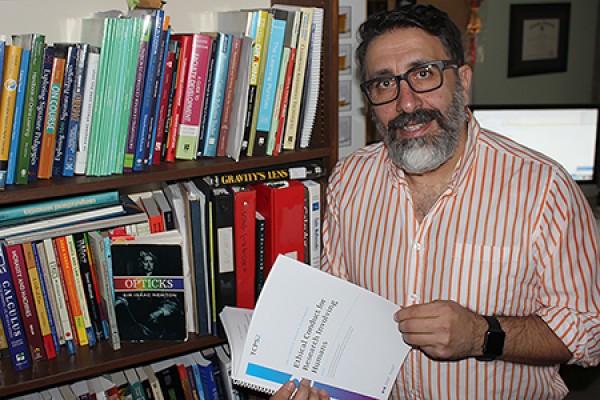 UWindsor researcher Pierre Boulos has joined the national Panel on Research Ethics. (photo by Jessica Raffoul)
UWindsor researcher Pierre Boulos has joined the national Panel on Research Ethics. (photo by Jessica Raffoul)
UWindsor researcher Pierre Boulos is honoured to have been appointed a member of the Panel on Research Ethics, which develops and interprets national-level policy on the ethics of research involving human participants.
Three federal research agencies, Canadian Institutes of Health Research (CIHR), Natural Sciences and Engineering Research Council (NSERC) and Social Sciences and Humanities Research Council (SSHRC), jointly created the Interagency Advisory Panel on Research Ethics in 2001 as part of a collaborative effort to promote the ethical conduct of research involving human participants.
“Being appointed to PRE is a huge honour,” says Dr. Boulos, special advisor for research ethics education and internalization, a learning specialist in the Centre for Teaching and Learning, and research fellow with the Centre for Research in Reasoning, Argumentation and Rhetoric.
“I've spent many years involved in research ethics locally, serving on UWindsor’s Research Ethics Board, as well as two hospital REBs and I'm looking forward to contributing to the policy guiding research ethics at a national level.”
Alan Scoboria, chair of UWindsor’s Research Ethics Board, says the panel is a select group of experts, and it is a tremendous honour to be invited to be a member. He says the complexity of research endeavors is rapidly increasing and this presents ongoing challenges for the ethical conduct of research.
“This appointment recognizes Dr. Boulos’ long standing local and national leadership to the development of a living research ethics,” says Scoboria, a psychology professor. “His capacity for keen ethical analysis and his amicable tenacity will serve us all well.”
Without participants in research, research could not be done, Boulos says, and those participants deserve to be protected and respected. He is currently writing a book on research ethics and the scholarship of teaching and learning.
“One of the messages I wish to get out there is that ethical issues aren't simply cautionary signs—telling us to avoid this or that—or impediments or hurdles to doing research, but rather, they offer us opportunities to reflect and examine the assumptions we operationalize in our research,” he says.
Michael Siu, vice-president, research and innovation, says this appointment is an important part of knowledge mobilization.
“I am absolutely delighted that Pierre will be able to extend his knowledge and expertise, and make a contribution nationally,” says Dr. Siu.
The 12 members of the panel develop, interpret and implement the Tri-Council Policy Statement: Ethical Conduct for Research Involving Humans. Boulos’ three-year term runs until December 2018.
